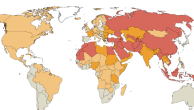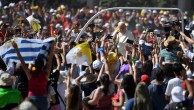
Relatively few Americans express concern about the use of religious rhetoric by political leaders. In fact, nearly twice as many say there has been too little reference to religious faith and prayer by politicians (41%) than say there has been too much (21%). President Bush receives particularly positive ratings in this regard. Most (62%) say the president mentions his religious faith the right amount with only a minority saying he does this too much (14%) or too little (11%).
This same sentiment carries over to religion’s influence on the president’s policymaking as well. Overall, six-in-ten Americans say the president relies a great deal (20%) or a fair amount (40%) on his own religious beliefs in making policy decisions. Roughly three-quarters of those who believe this say the influence of religion on the president’s policy decisions is appropriate. Just 22% of those who see Bush influenced a great deal by his religion say it is inappropriate.

If anything, there is more criticism of the president for taking his faith into account too little, rather than too much. While most (58%) say the president relies on his faith the right amount, twice as many (21%) would like to see religion play a larger role in the president’s policymaking as see it as excessive (10%). This view is particularly strong among those who think the president’s decisions are currently not affected by his faith. Of the 31% who say the president does not rely on his own religious beliefs when making policy decisions, most (51%) would like to see him do so more.
White respondents, particularly evangelical Protestants, are comfortable with the influence of the president’s personal faith on his policymaking. Fully 63% of whites and 78% of white evangelical Protestants say Bush’s religion has the right amount of influence on his policy decisions, compared with 16% who say his religion has too little influence. Black respondents, particularly black Protestants, are critical of how little Bush relies on his religious faith. Half of all blacks, and 56% of black Protestants, say the president relies on his religious beliefs too little in making policy decisions. Only about a quarter of blacks and black Protestants say he takes his faith into account the right amount.
Seculars those who identify themselves as agnostic or atheist, or who claim no religious affiliation and rarely, if ever, attend religious services are the only group in which a significant number express concern about religion affecting Bush’s policymaking too much. Three-in-ten seculars are critical in this regard, though a plurality (40%) believes religion has an appropriate impact on the president’s policymaking.
A Survey Experiment: Reactions to Religious Rhetoric
Although there is widespread comfort with the idea of politicians and the president in particular referencing religion in their speeches and political decisions, many Americans express a general discomfort when exposed to actual religious statements by various politicians. As part of the survey, half the respondents were asked whether they were comfortable or uncomfortable with a series of statements about politics and religion, with no reference to who made the statements. The other half of respondents were read the same statements with their speakers identified.
[T]

But some statements raised concerns among a number of respondents. Nearly four-in-ten (38%) felt uncomfortable with a statement made by Attorney General John Ashcroft: “Unique among the nations, America recognized the source of our character as being godly and eternal….” This reaction did not change noticeably when the statement was attributed to the attorney general.
The statement that raised the most concern among respondents was the following: “I have never believed the Constitution required our schools to be religion-free zones….” Nearly half (49%) said they felt uncomfortable with this statement, when presented anonymously, while 44% were comfortable with it. But comfort with this quote was significantly higher when it was attributed to its source former President Bill Clinton. When tested with Clinton’s name attached to it, discomfort was lower (34% vs. 49%).
Compared with Democrats and independents, Republicans were somewhat more comfortable with the statements of Bush and Ashcroft when the speakers were identified, and Democrats and independents were much more comfortable with Clinton’s statement when they learned it came from the former president. But another important effect of providing the source of the quote is the added legitimacy it can provide, even to people of a different party. The results suggest that this effect is particularly strong when the statement comes from a current or past president.

Conservatives were far more likely than liberals to say they were comfortable with the anonymous statement, “I have never believed the Constitution required our schools to be religion-free zones….” Six-in-ten conservative Republicans were untroubled by a major politician making such a statement, compared with just 35% of liberal Democrats. However, when the statement is attributed to its source former President Bill Clinton this ideological gap largely disappears. Liberal Democrats were much more comfortable with the quote (59%), nearly on par with their more conservative counterparts.
A different pattern is evident in responses to the statement, “The liberty we prize is not America’s gift to the world, it is God’s gift to humanity.” When the statement was presented anonymously, liberals were less comfortable than conservatives. When the quote was attributed to President Bush, conservatives became significantly more comfortable with the statement, and independents and moderate Democrats became somewhat more comfortable. Only liberal Democrats were unaffected by knowing that the statement came from the president.

[T]
Reactions to the statements also varied according to the nature of the religious references in them. Specifically, the two items that expressly refer to God or godliness were widely accepted by highly religious Americans but made many less religious Americans uncomfortable. The two statements referring to the constitutional border between church and state without reference to God or faith were viewed with equal comfort (or discomfort, depending on the quote) across all levels of religious commitment.
Evangelicals, Blacks Favor Churches Expressing Views

The public is divided over the proper role of churches and other houses of worship in political matters. As has been the case in surveys conducted over the past decade, a slight majority (52%) say churches should express their views on day-to-day social and political questions, while somewhat fewer (44%) say they should keep out of political matters. If clergy do speak out on the issues, most say they should express their own views, rather than reflect the views of their congregation.
As in the past, a person’s age and ethnic/religious background shape views on church involvement in political issues. Most people under age 50 think churches should express their views on day-to-day social and political questions, while most over age 65 think they should keep out of political matters. Overall, blacks are far more supportive of church involvement in political issues than are whites or Hispanics. Two-thirds of African-Americans say churches should express their views, compared with half of whites and Hispanics (50% and 53%, respectively).
White evangelical Protestants, particularly those who are the most religiously committed, also support church activism. Roughly two-thirds (68%) of white evangelicals say churches should express their opinions on political issues, including 73% of those who are the most religiously active. By comparison, fewer than half of white mainline Protestants (43%) and white non-Hispanic Catholics (46%) share this view.
The majority position across all ages and religious groups is that if clergy do speak out, they should express their own views, even if most members of their congregations disagree with them. Overall, 52% take this position, while 36% say clergy should reflect the views of the congregation. Unlike the issue of whether churches should take a position or not, on this issue there is little variation across ethnic and religious lines. Slight majorities in all major religious groups, and at all levels of religious intensity, share this position.
Religious Leaders in Politics: Yes But…

Americans are divided, largely along religious lines, about the role religious leaders should play in the political system. About as many would like to see more religious leaders serving as advisers for elected officials (33%) as would like to see less of this (28%). The same pattern holds for public views of religious leaders running for public office (30% more, 29% less) and appearing on television talk shows (26% more, 32% less). There is notably less enthusiasm for religious leaders forming political movements just 22% would like to see more of this, while nearly twice as many (42%) would like to see less.

There are wide denominational and racial differences of opinion on this issue. For example, two-thirds of white evangelical Protestants (65%) and nearly as many black Protestants (61%) say they would like to see more religious leaders serving as advisers to politicians. Just 19% of white mainline Protestants and white Catholics agree. Similarly, there is significant enthusiasm for more religious leaders running for public office among white evangelicals and blacks, but significant opposition to this from white mainline Protestants and Catholics.
Most Favor Journalists Asking About Religion

Most Americans (57%) say it is proper for journalists to ask politicians how their religious beliefs affect their opinions on issues of the day. Roughly four-in-ten (39%) disagree, but about half of those who object (20% of the overall sample) say it is okay for journalists to inquire about a politician’s religious beliefs if the politician raises the issue first.
While there is no partisan or ideological divide on this issue, there is a substantial difference across religious lines. White evangelical Protestants, by more than two-to-one (66% to 31%), have no problem with journalists asking politicians how religious beliefs affect their political views. Catholics, both Hispanic and non-Hispanic, are more divided on whether this is appropriate or not.




